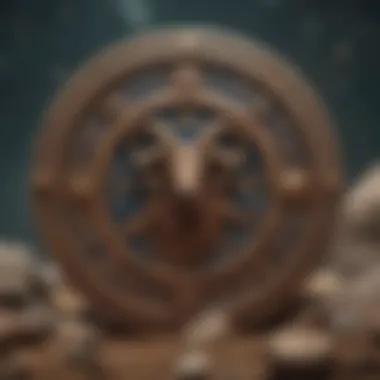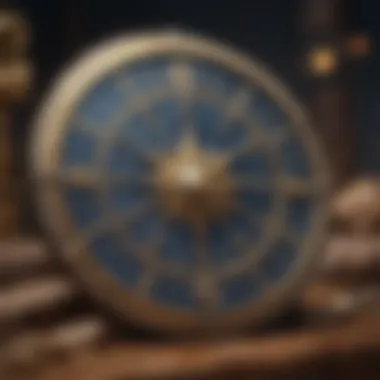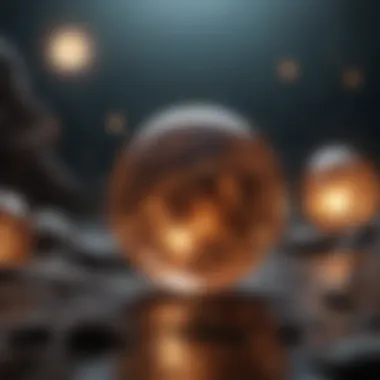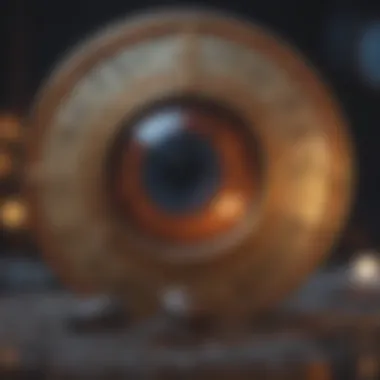Understanding Horoscopes: A Comprehensive Exploration


Intro
Horoscopes have intrigued humanity for centuries, weaving themselves into the fabric of various cultures and belief systems. They offer a glimpse into the celestial influences on human life, generating a mixture of reverence and skepticism. The study of horoscopes demands an understanding of their historical roots, the methods of interpretation, and their contemporary relevance. In this article, we will dissect what horoscopes represent, how they are crafted, and their perceived significance worldwide.
Historical Origins
The roots of horoscope calculations trace back to ancient civilizations, including the Babylonians, Egyptians, and Greeks. The Babylonians, during the second millennium BCE, first practiced astrology by charting celestial bodies and observing their movements. They pioneered a systematic method of linking planetary positions to events on Earth, laying the groundwork for modern astrology.
With time, the Greeks adopted these concepts, expanding and refining them. The notable figure of Ptolemy in the 2nd century CE authored the Tetrabiblos, a seminal text that outlined astrological principles and influenced countless generations.
The Structure of Horoscopes
Horoscopes are generated based on an individual's birth data. This includes the date, time, and location of birth. Such information forms a natal chart. The chart reveals the positions of the planets in relation to the twelve zodiac signs and houses, each connected to different traits and aspects of life.
The primary components of a horoscope include:
- Zodiac Signs: twelve divisions that represent varying traits and influences.
- Houses: areas of the chart indicating different life aspects like career, relationships, and health.
- Aspects: angles formed between planets, offering insights into interactions and relationships.
Different astrologers may emphasize various interpretations, resulting in unique variations of horoscopes.
Cultural Significance
Throughout history, horoscopes have played vital roles in numerous societies. In many cultures, they were used for making significant decisions — from matters of state to personal relationships. The mystique of horoscopes often stems from their ability to provide insight into the uncertainties of life.
Today, horoscopes have a prominent place in popular culture. They appear in newspapers, magazines, and various websites. The fusion of tradition and modernity makes horoscopes accessible to a wider audience. While some people treat them as mere entertainment, others seek deeper meanings and personal guidance.
Horoscopes symbolize a bridge between ancient wisdom and modern existential questions, prompting individuals to reflect on their lives and choices.
Scientific Perspectives
Despite their long-standing popularity, horoscopes face significant critique from scientific communities. Skeptics argue that astrology lacks empirical support. They emphasize the absence of controlled studies to validate astronomical claims. Many consider horoscopes to be products of generalizations and cognitive biases, leading to the placebo effect or confirmation bias.
Nonetheless, the psychological effects of horoscopes can be profound. Some studies suggest that engaging with horoscopes may fulfill psychological needs, like coherence and stability, even if their foundations are scientifically unfounded.
The End
To grasp the intricacies of horoscopes is to embark on a journey spanning culture, science, and personal introspection. Their relevance persists, inviting both belief and skepticism. The delicate balance between historical significance and contemporary interpretations keeps the dialog alive about the wisdom embedded in the stars.
Understanding horoscopes offers insights not just into astrology itself but into human nature and our desire for meaning and connection with the cosmos.
Defining Horoscope
Defining horoscope is essential to understanding astrology and its implications. A horoscope serves as a personalized map of the sky at the time of a person's birth, capturing the positions of celestial bodies. These positions provide insights into an individual’s character traits, potential challenges, and life paths. By analyzing horoscopes, one can gain a deeper appreciation for how these celestial alignments affect personal lives.
Basic Components of a Horoscope
A horoscope is an intricate blend of several key components that work together to form a comprehensive view of an individual's astrological identity. The primary elements include:
- Zodiac Signs: There are twelve zodiac signs, each representing distinct personality traits and influences. The sign under which a person is born often dictates certain behavioral tendencies.
- Planets: In astrology, planets are associated with specific energies and aspects of life. For instance, Venus influences love and relationships, while Mars pertains to action and determination.
- Houses: The horoscope is divided into twelve houses, each relating to specific life areas, such as career, relationships, and health. The planets' placements in these houses reveal insights into various aspects of one's life.
- Aspects: Aspects refer to the angles formed between planets. They indicate the relationships and interactions between the various celestial bodies, allowing for more nuanced interpretations.
Each of these components contributes uniquely to the overall narrative of a horoscope. Understanding these elements is essential for anyone seeking to interpret horoscopes accurately.
Cultural Interpretations of Horoscopes


Horoscopes are not just tools for personal insight; they are deeply rooted in cultural practices and beliefs. Different cultures have historically contributed to the understanding and application of astrology in unique ways. In Eastern cultures, such as in Vedic astrology, the focus is on the lunar phases and the Nakshatras, or lunar mansions. This perspective emphasizes time cycles and the connection between celestial movements and human experiences.
In contrast, Western astrology tends to prioritize solar influences and the twelve zodiac signs. This system has evolved significantly over centuries and has adapted to modern contexts, while still holding onto its traditional roots.
Understanding diverse cultural interpretations of horoscopes enriches the overall comprehension of astrology. It highlights the shared human interest in celestial influences and self-discovery across civilizations.
In summary, defining horoscope involves a multifaceted exploration of its components and cultural significance. Through this lens, readers gain insightful perspectives on how astrological beliefs have developed over time and how they continue to shape individual and collective experiences.
Historical Context
Understanding the historical context of horoscopes is essential to grasp their significance today. The practice of astrology has roots that extend into various civilizations and cultures. By examining how horoscopes have evolved through time, readers gain insights into the frameworks that shaped astrological beliefs. This exploration can help illuminate how ancient practices influence modern interpretations, providing a richer appreciation for the complexities of horoscopic readings.
Origins in Ancient Civilizations
Horoscopes trace their origins to ancient civilizations, where they were intertwined with cultural and religious beliefs. The Babylonians were among the first to formulate horoscopic systems around the second millennium BCE. They meticulously observed celestial movements, linking astronomical phenomena with earthly events. The connection between the stars and human affairs was not merely speculative; it was an integral part of their societal functions, influencing agriculture, politics, and personal decisions.
Egyptians also made significant strides. They integrated their deities into astrological frameworks, assigning divine importance to planetary movements. The Greeks later adopted and adapted these ideas, particularly through philosophers such as Ptolemy, who further systemized astrology. His work Tetrabiblos influenced astrology for centuries. The Romans, too, embraced horoscopes, seeing them as tools for prediction and guidance.
Evolution Through Renaissance and Enlightenment
The Renaissance marked a pivotal moment for astrology. Amid a rebirth of classical knowledge, scholars began to scrutinize astrological practices more rigorously. Figures like Johannes Kepler attempted to reconcile astrology with emerging scientific principles. He proposed that celestial bodies exerted influence through gravitational pull. However, as empirical methodologies gained ground, astrology faced growing skepticism.
By the Enlightenment, astrology found itself in a contentious position. The era emphasized rationality and scientific reasoning, leading many to challenge the credibility of astrological claims. Despite criticism, interest in horoscopes persisted. They became popular not just as predictive tools but as personal narrative devices. The symbolic language of astrology began to intertwine with psychology, creating a unique blend of self-discovery and reflection.
In summary, the historical context of horoscopes reveals a longstanding tradition that straddles the line between science and belief. The way ancient civilizations approached horoscopes influences present-day practices. Each period contributed layers of complexity and interpretation that continue to resonate with enthusiasts and skeptics alike.
Astrological Principles
Astrological principles form the backbone of horoscope interpretation. They connect celestial movements to human experiences. This section will analyze key elements like zodiac signs, planetary roles, and house systems. Understanding these principles is crucial for anyone wanting to grasp the complexities of astrology.
Zodiac Signs and Their Attributes
Zodiac signs are fundamental in astrology. They represent distinct personality traits and tendencies. There are twelve zodiac signs, each correlating with specific characteristics.
- Aries: Energetic and pioneering.
- Taurus: Practical and reliable.
- Gemini: Adaptable and communicative.
- Cancer: Sensitive and nurturing.
- Leo: Charismatic and confident.
- Virgo: Detail-oriented and analytical.
- Libra: Balanced and sociable.
- Scorpio: Intense and passionate.
- Sagittarius: Adventurous and philosophical.
- Capricorn: Disciplined and ambitious.
- Aquarius: Innovative and humanitarian.
- Pisces: Imaginative and compassionate.
Each sign operates within specific dates in the calendar year, forming a matrix of influences. People often identify with their sun sign, yet they are more than just their sign. The full astrological profile includes their moon and rising signs, known as the Ascendant. This combination offers a fuller picture of an individual's personality and inclinations.
Planets and their Roles in Astrology
In astrology, planets serve as dynamic forces that influence our lives. Each planet has a particular significance and represents different aspects of human existence. For example, Mars symbolizes drive and aggression, while Venus embodies love and beauty.
Planets interact in various ways, influencing a person's horoscope.
- The Sun: Represents core identity and vitality.
- The Moon: Relates to emotions and subconscious.
- Mercury: Linked to communication and intellect.
- Jupiter: Symbolizes growth and expansion.
- Saturn: Represents discipline and structure.
Understanding these roles helps individuals comprehend the underlying motivations and challenges they may face. Each planet’s position within a zodiac sign and house further refines its influence.
House Systems and Planetary Positions
House systems play a vital role in astrological analysis. There are twelve houses in astrology, each governing specific areas of life, such as relationships, career, and home. The positioning of planets in these houses provides context for their influences.
- 1st House: Self and identity.
- 2nd House: Finances and values.
- 3rd House: Communication and learning.
- 4th House: Home and family.
- 5th House: Creativity and romance.
- 6th House: Health and service.
- 7th House: Partnerships and marriage.
- 8th House: Transformation and shared resources.
- 9th House: Philosophy and travel.
- 10th House: Career and public image.
- 11th House: Friendships and community.
- 12th House: Spirituality and unconscious.


Astrologers often utilize different house systems, such as Placidus or Whole Sign, each providing unique insights. The interactions between planetary positions also highlight distinct life themes. Each placement adds layers to an interpretation, enhancing the personal relevance of horoscopes.
Understanding astrological principles is essential for interpreting horoscopes accurately. They provide a framework for analyzing natural connections between our experiences and the cosmos.
Horoscope Creation Process
The process of creating a horoscope is fundamental to understanding astrology's practical applications. In this section, we will explore how horoscopes are constructed, the significance of calculating birth charts, and the interpretation of various astrological aspects and transits.
Calculating Birth Charts
Calculating a birth chart is a crucial step in horoscope creation. This chart maps the positions of celestial bodies at the exact moment of an individual's birth and provides insights into personality traits and life paths. To calculate a birth chart, several elements must be considered:
- Date of Birth: The day, month, and year of birth determine the position of the sun and other planets.
- Time of Birth: The exact time is essential to capture the precise positions of the planets within the twelve astrological houses.
- Place of Birth: Geographic location influences planetary positions, adjusted for time zone and latitude.
Accurate calculations can utilize software or traditional methods, including ephemerides, a table listing the positions of celestial bodies over time. Once the birth chart is calculated, it reveals the individual's sun sign, moon sign, and rising sign, each offering a different layer of personality insight.
Interpreting Aspects and Transits
After calculating the birth chart, the next step involves interpreting aspects and transits. Aspects refer to the angles between planets within the chart, indicating how these celestial bodies interact. A few common aspects include:
- Conjunction: When two planets are close together, their energies blend.
- Square: A 90-degree angle symbolizes tension and challenges.
- Trine: This aspect represents harmony and ease between planets.
Transits are the current positions of planets as they move through the sky, interacting with points in the natal chart. These movements can trigger significant life events or periods of reflection. Understanding transits allows individuals to navigate changes more effectively.
The interplay between aspects and transits sheds light on both internal growth and external events, guiding personal development and decision-making.
Types of Horoscopes
The topic of horoscopes is vast and varied. Understanding the different types of horoscopes allows individuals to navigate their astrological landscapes more effectively. Each type caters to distinct aspects of life, providing insights that might guide decisions or behaviors. This section outlines several categories, emphasizing their specific elements, benefits, and the considerations associated with each type.
Daily, Weekly, and Monthly Forecasts
Daily, weekly, and monthly horoscopes are some of the most commonly sought-after forms of astrological guidance. They provide brief snapshots of what one can expect in the near future.
- Benefits: These forecasts offer daily encouragement or warnings that might influence personal choices. Readers may find comfort in knowing what to anticipate, potentially improving their emotional resilience.
- Considerations: While they can be motivating, it is crucial to recognize their broad nature. Many factors in individual lives do not get included in such general readings. Thus, personal circumstances should also factor into decision-making processes.
Additionally, according to astrology enthusiasts, checking these forecasts regularly can cultivate a sense of connection to the cosmos.
Compatibility and Relationship Horoscopes
Horoscopes focused on compatibility are instrumental for individuals exploring romantic prospects or friendships. They analyze the compatibility between two or more people based on their astrological signs.
- Importance: Such horoscopes can clarify relationship dynamics, highlighting strengths and weaknesses inherent in paired signs. They often delve into aspects such as emotional compatibility or communication styles.
- Limitations: However, these readings should not be viewed as absolute determinants of relationship success. The complexities of human interaction extend far beyond astrological insights.
Astrologers often emphasize that while compatibility horoscopes can serve as guides, they should supplement rather than direct relationship choices.
Career and Financial Horoscopes
Career and financial horoscopes are vital for those navigating professional decisions or economic planning. They focus on how celestial movements may impact one’s job choices and economic prospects.
- Functionality: These horoscopes can highlight auspicious times for career advancement or financial investments. Followers often use them to align their actions with favorable periods forecasted by their zodiac signs.
- Caution: Despite the potential advantages, one must approach these readings with a critical mindset. Over-reliance on astrological advice without considering personal skills, aspirations, or market conditions can lead to misguided choices.
In summary, while daily, compatibility, and career horoscopes provide valuable perspectives, the reader should maintain a balanced view. Astrology can be an exciting tool for exploration but should complement personal judgment and experience.


Cultural Significance
The cultural significance of horoscopes cannot be understated. Different societies have embraced astrology in unique ways, shaping their own traditions and beliefs around the interpretation of celestial bodies. This exploration is crucial for understanding how horoscopes fit into the broader tapestry of cultural practices and personal belief systems. The intersection of astrology with various cultural elements offers valuable insights into human behavior and social norms.
Astrology in Eastern Cultures
In many Eastern cultures, astrology holds a prominent position that often intersects with spiritual beliefs. For instance, in India, Vedic astrology, known as Jyotish, is deeply woven into the fabrics of daily life. Here, individuals consult horoscopes for guidance on family matters, auspicious timings, and personal endeavors. The significance of planetary positions in Jyotish plays a critical role in shaping destinies.
Chinese astrology, on the other hand, revolves around the lunar calendar, with each year represented by an animal, which influences the personalities and fates of individuals born in those years. The twelve animals of the Chinese zodiac, such as the Rat, Ox, and Tiger, have profound cultural meanings, often dictating societal roles and expectations.
Critical Perspectives
The examination of horoscopes provides more than just insights into personality and fate; it invites scrutiny regarding the very foundation of astrological beliefs. Critical perspectives highlight the significance of analyzing horoscopes within a rational framework. This section delves into the scientific examination of astrology and the psychological influences it exerts on its adherents, offering a balanced view that contrasts belief with empirical understanding.
Scientific Examination of Astrology
Astrology, despite its widespread popularity, often faces skepticism from the scientific community. A key aspect of this skepticism is the lack of empirical evidence supporting astrology's predictions and claims. Studies attempting to validate astrology's accuracy often reveal flaws in methodology or fail to demonstrate consistency across different astrologers.
Scientific inquiry into astrology typically involves:
- Statistical Analysis: Research often utilizes statistical methods to assess whether astrological predictions are reliable or if they happen by chance. Most studies conclude that there is no significant correlation between astrological forecasts and actual life events.
- Controlled Experiments: Some experiments gauge the ability of astrologers to accurately interpret horoscopes in blind conditions. Results usually show no better accuracy than random guessing.
These scientific examinations feed ongoing debates about astrology as a pseudoscience, elucidating the question of whether it holds any scientific merit or remains purely a matter of belief.
Modern Applications
The relevance of horoscopes in today's world is significant. With advancements in technology, the way individuals access and interpret horoscopes has changed, making them more widely available than ever. This section highlights the modern applications of horoscopes, focusing on their digital integration and the impact of social media.
Digital Era and Horoscopes
In the digital age, horoscopes have found new platforms. People can generate their personalized horoscopes using various applications and websites. These digital tools enable users to access tailored information based on their birth date, time, and location. This personalization is crucial for those seeking specific insights into their lives.
Moreover, websites like zodiacsigns.com and astrology.com are dedicated to offering in-depth analysis and daily forecasts. Furthermore, users can find compatibility readings and career guidance. The simplicity of accessing horoscopes online has widened their appeal.
Another significant benefit of this digital transition is the speed at which individuals receive updates on astrological movements. This immediacy allows for real-time adjustments to one’s understanding of personal events based on horoscope insights.
Influence of Social Media
Social media platforms have transformed how horoscopes are shared and discussed. Astrology content is prevalent on platforms like Instagram and TikTok. Inspirational quotes, memes, and detailed explanations of zodiac traits engage a broad audience. This form of engagement creates communities where individuals can share experiences and interpretations.
Additionally, many astrologers have found a significant presence online. They provide daily, weekly, or monthly insights through live streams or posts. This method has made horoscopes more accessible and interesting for younger generations.
"The intersection of social media and astrology demonstrates a cultural shift toward greater openness in exploring personal identities and beliefs."
However, while social media can enhance knowledge and communication about horoscopes, it can also lead to misinformation. It is essential for individuals to verify the reliability of sources they follow, given the growing number of influencers without formal astrological training.
In summary, modern applications of horoscopes highlight their evolution in the digital world and social landscape. The ongoing integration of these practices into daily life reflects a changing perception of astrology, making it more approachable and relevant for diverse audiences.
Ending
Horoscopes hold a unique place in our society, weaving together history, culture, psychology, and personal beliefs. Their ongoing relevance reflects a blend of ancient wisdom and modern curiosity. In evaluating the various components of horoscopes, one can appreciate not just their individual elements, but also their cumulative impact on society as a whole.
The Ongoing Relevance of Horoscopes
In today’s world, horoscopes are more accessible than ever, thanks to the internet and social media. People from various backgrounds engage with astrological content, seeking guidance or simply a moment of reflection. The reasons for this continued interest are multifaceted:
- Cultural Resonance: Many individuals find that horoscopes offer a sense of belonging or a connection to their cultural roots. In numerous cultures, astrology has deep historical significance, which continues to influence practices and beliefs today.
- Personal Insight: Horoscopes often serve as tools for self-exploration. By understanding astrological positions and interpretations, individuals can gain perspectives on their personalities, relationships, and future possibilities, sometimes leading to personal growth.
- Community Engagement: Online platforms, such as Facebook and Reddit, allow for discussions around horoscopes. These forums create communities where people can share experiences and insights, fostering a sense of camaraderie among those with similar beliefs.
- Scientific Debate: The enduring presence of horoscopes prompts ongoing discussion about their validity. Skeptics advocate for a scientific approach, influencing many to question and analyze the principles of astrology in a structured manner.
The dialogue between belief and skepticism regarding horoscopes drives both personal introspection and broader cultural discussions, making it a continuously evolving topic.
As we conclude our exploration into horoscopes, it is essential to recognize that their value transcends empirical validation. They evoke emotions, spark discussions, and at times, provide clarity in uncertainty. Understanding horoscopes is not merely an academic pursuit; it is a reflection of human experiences, beliefs, and aspirations that continue to shape our lives.







